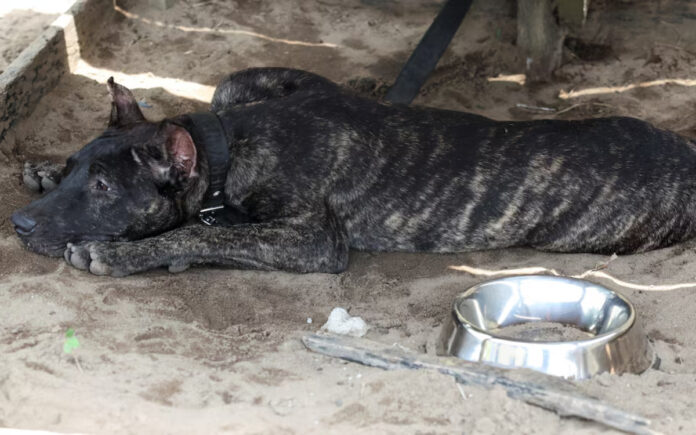Ibadan: Nigeria’s ongoing cost-of-living crisis, which has driven up the price of essentials like rice by over 100% since 2023, is now impacting the country’s growing community of dog owners. As pet food prices skyrocket, even relatively affluent households are struggling to keep their pets fed, highlighting the far-reaching effects of the nation’s economic challenges.
Pet ownership, particularly of dogs, has surged in urban Nigeria over the past two decades. Traditionally, animals like chickens or goats were kept for food, but dogs have become popular for security in a nation grappling with violent crime, as well as for companionship. A 2023 TGM Statbox survey estimated that 42% of Nigerians own pets, though precise data on dog ownership remains scarce. However, the rising cost of pet care is turning this once-accessible luxury into a financial burden.
Peter Anthony, a student from Ibadan, shared the strain his family faces in feeding their German Shepherd, Flora. “Before the whole high cost of living saga, feeding her was so easy,” he said, waiting for Flora at a pet hospital where she was treated for an ear condition. “But now, by the time you pick out that money from your pocket, you’d know that something has left you.” To cope, the family has reduced Flora’s daily meals to smaller portions of noodles mixed with fish or eggs.
The economic crisis, triggered in May 2023 by the removal of fuel subsidies and the naira’s devaluation, has fueled inflation, which peaked at 34.80% in December 2024—its highest in 30 years—before dropping to 23.71% in April 2025. With 31% of Nigeria’s 200 million people living below the World Bank’s extreme poverty line of $2.15 per day, even pet owners, who are generally not among the poorest, are feeling the pinch.
Dog breeders and pet businesses are also scaling back. Sarah Mokelu, a 63-year-old Lagos-based importer of dogs from Russia, has cut her trips from twice a month to once every three months due to rising costs and declining demand. “Feeding has really humbled a lot of people,” said Mokelu at her home in Ejigbo. “There was a feed we bought about six months ago for 40,000 naira ($25.70), now we’re buying for 70,000 naira.” This price for a 15-kg bag of pet food now equals Nigeria’s minimum monthly wage.
Also Read | Greta Thunberg Deported from Israel After Gaza Aid Mission Intercepted
Akindele Olunloyo, CEO of Pet Lovers Nigeria, has shifted his business model to focus on high-net-worth clients. “I now import only for clients who are interested in buying their own food, high net worth Nigerians who place specific orders,” he said. His online platform reveals a growing market for dogs priced between 20,000 and 100,000 naira, far below the 300,000–500,000 naira for imported breeds.
To manage costs, many owners and breeders have switched from imported dog food to cheaper local alternatives, such as rice or noodles mixed with fish eggs. This shift has boosted local pet food producers. “People not being able to afford the foreign kibbles … made people to look in our direction,” said Theresa Iwhewhe, who runs a pet hospital and pet food company in Ibadan. According to ReportLinker, Nigeria’s pet food imports are projected to fall to 769,000 kg by 2028, down from 1.3 million kg in 2023, reflecting the growing reliance on local options.
Also Read | South Korea’s Jogye Temple Escapes Fire, Cultural Treasures Unharmed
As Nigeria’s economic challenges persist, the rising cost of pet care underscores the broader impact of inflation, forcing even pet owners to adapt to a new reality of scarcity and sacrifice.



